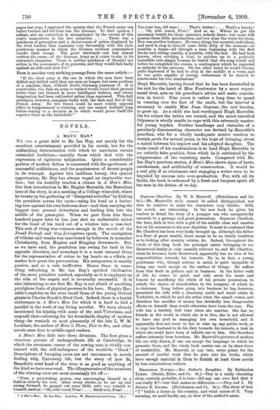NOVELS.
A MAN'S MAN *
WE owe a great debt to Mr. Ian Hay, not merely for the
excellent entertainment provided in his novels, but for the unflinching determination with which he maintains certain outmoded traditions,—notably those which deal with the expression of righteous indignation. Quite a considerable portion of modern fiction is concerned with the apotheosis of successful caddishness, and the acquiescence of decent people in its triumph. Against this insidious heresy, this cynical
opportunism, Mr. Hay has always waged an implacable war- fare ; but his hostility reaches a climax in A Aran's Man.
Our first introduction to Mr. Hughie Marrable, the Herculean hero of the story, is at a meeting of a College wine-club, where he breaks up the gathering of "dissipated nobodies" by kicking the president across the room—using his head as a batter- ing-ram against his own bedroom door—and then carrying the biggest man present downstairs and hurling him into the
middle of the grass-plot. When we part from him three hundred pages later be has just shot an undesirable suitor for the hand of his ward out of a window into a rose-bed. This sort of thing was common enough in the novels of the Frank Farlegh and Guy Livin.gstone epoch. The castigation of villains and sneaks was sanctioned by believers in muscular Christianity, from Hughes and Kingsley downwards. But, as we have said, the pendulum has swung far back in the opposite direction, and nowadays it is a most unusual thing for the representative of virtue to lay hands on a villain, no
matter how great the provocation. His antagonism is usually passive, and as a rule ineffective. Hence there is some-
thin., refreshing in Mr. Ian Hay's spirited vindication the of l more primitive method, especially as it is employed on the side of the angels and is invariably successfuL It is
also interesting to see that Mr. Hay is not afraid of ascribing prodigious feats of physical prowess to his hero. Hughie Mar- rable's exploits on the river recall those of the young Oxford
giants in Charles Reade's Hard Cash. Indeed, there is a boyish exuberance in A Man's Man for which it is hard to find a parallel in the work of any living novelist. We have already mentioned his kinship with some of the mid-Victorians, and may add that—allowing for his formidable display of modern slang—he reminds us most pleasantly, of the late L. W. M. Lockhart, the author of Mine is Thine, Fair to See, and other novels once dear to middle-aged readers.
A Man's Man falls into three divisions. The first gives a vivacious picture of undergraduate life at Cambridge, in which the strenuous career of the rowing man is vividly con- trasted with the self-indulgence of the would-be "blood." Descriptions of bumping races are not uncommon in novels dealing with University life, but the story of how St. Benedict's went head of the river is as good as anything of
the kind we have ever read. The idiosyncrasies of the members of the winning crew are most amusingly hit off :—
"Four, a painstaking person, was encouraging himself in a fashion entirely his own. After every stroke, as he sat up and swung forward, he gasped out some little sotto "twee remark to himself, such as—' Oh, well rowed, Four ! . . . Stick to it, Four! . . .
• A Man's Man. By Ian Hay. London; W. Blackwood and Sons. [63.] Use your Zegs, old man ! . . . That's better ! . . . That's a beauty ! . . . Oh, well rowed, Four And so on. Where he got the necessary breath for these exercises nobody knew; but some folk possess these little peculiarities, and row none the worse for them. Bow VMS another instance. He was a chirpy but eccentric individual, and used to sing to himself some little ditty of the moment—or possibly a hymn—all through a race, beginning with the first stroke and ending exactly, if possible, with the last. He had been known, when stroking a boat, to quicken up to a perfectly incredible rate simply because he feared that the song would end before he completed the course, a contingency which he regarded as unlucky in the extreme. On the other hand, he would become quite depressed if he had to stop in the middle of a verse, and he was quite capable of rowing rallentando if he desired to synchronise his two conclusions.'
Hugh Marrable, having found that he has been forestalled in his suit for the hand of Miss Freshwater by a more experi- enced rival, acts on his guardian's advice and seeks consola- tion in travel. Nine years is rather a long time to spend in roaming over the face of the earth, but the interval is necessary to enable Miss Joan Gaymer, the real heroine, to grow up. As a child she had worshipped Hugh Marrable. On his return the tables are turned, and the much-travelled
Odysseus is wholly unable to cope with this extremely master-
ful young hoyden. Further handicaps and obstacles of a peculiarly disconcerting character are devised by Marrable's
guardian, who for a wholly inadequate motive resolves to remain perdu for several years, in the hope of bringing about a match between his nephew and his adopted daughter. The main result of his machinations is to land Hugh Marrable in an entirely false position, from which he is extricated by the reappearance of the vanishing uncle. Compared with Mr. Ian Hay's previous stories, A Man's Man shows signs of haste,
carelessness, and artificiality of construction. It -would be a real pity if so wholesome and engaging a writer were to be beguiled by success into over-production. For, with all its faults, the book is redeemed by a fresh and buoyant spirit all too rare in the fiction of to-day.






























































 Previous page
Previous page